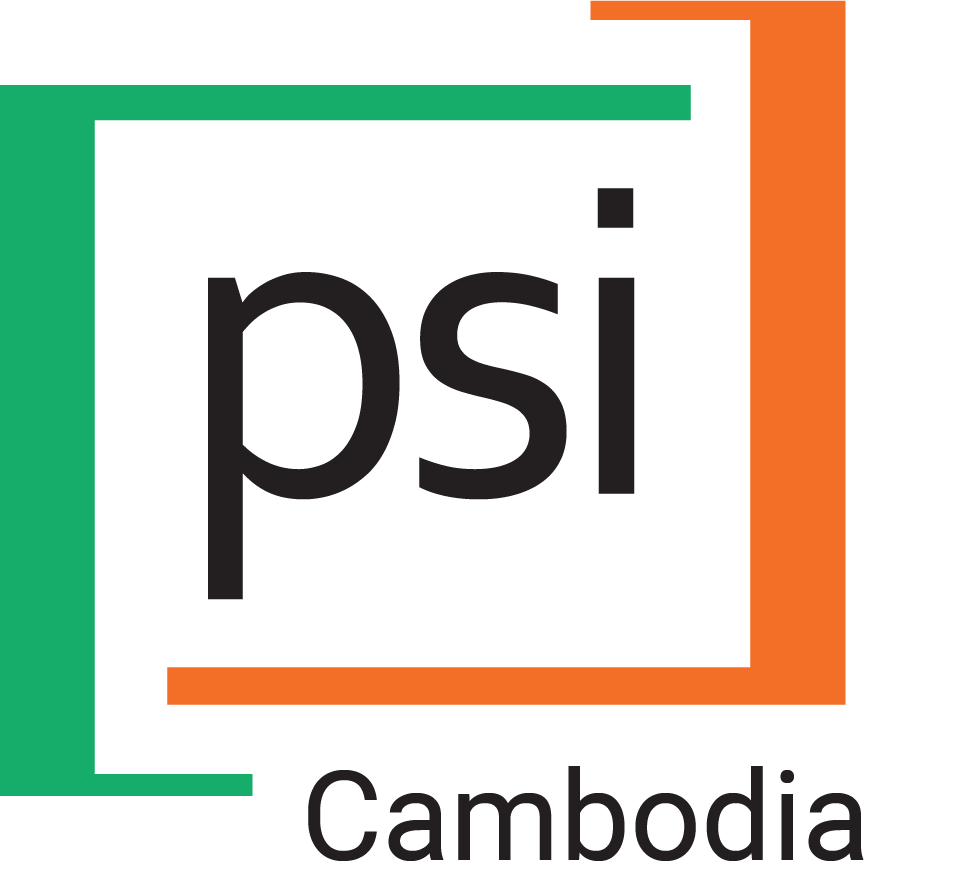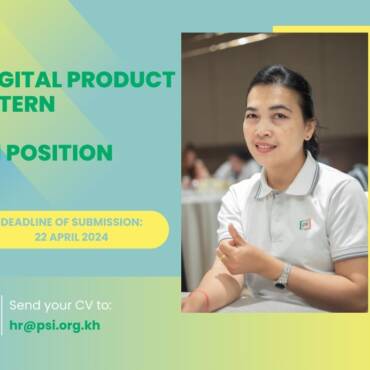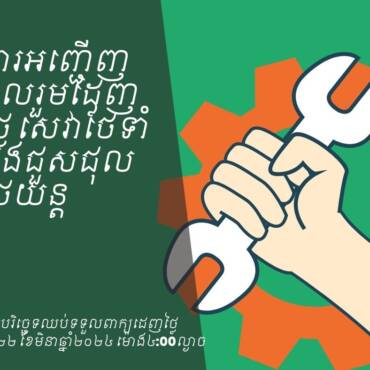Drinking Treated Water and Washing Hands at 5 Critical Times Keeps Tummy Bugs Away
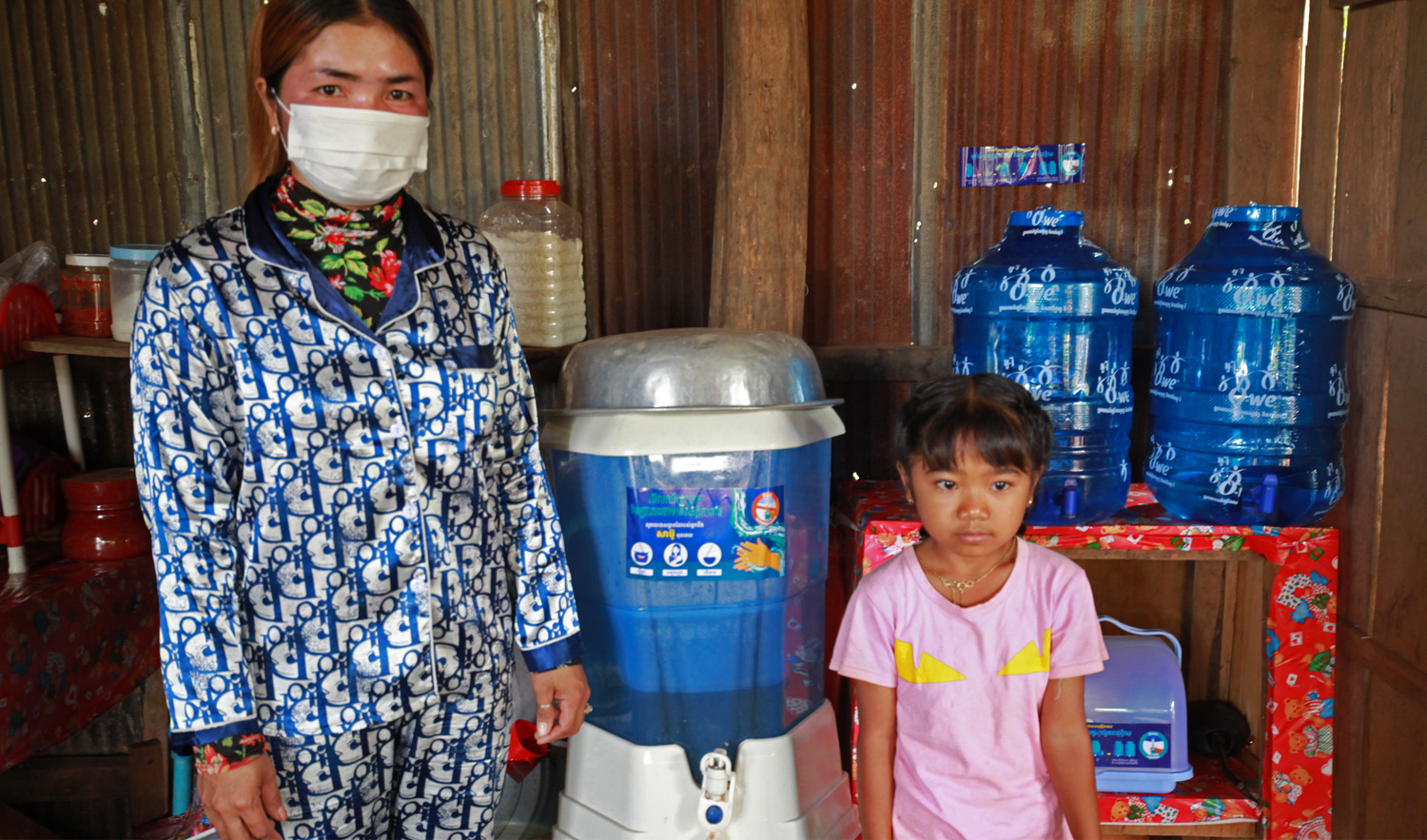
“Drinking filtered water keeps my family healthy. I do not have to take time from work to care for sick children and have more energy to complete daily tasks!” – Leng SokLea, Influencer, Khlei Village, Tbong Khmum Province
Cambodia is a country with large rural population and rural households sometimes do not have access to treated water. Consuming untreated water such as ground water from the well directly is a common practice for some families and there is a persistent perception that it is safe to drink, especially when the water looks clean and without visible dirt and smell. Similarly, many share this perception with regard to hand washing behavior. Field immersion study result indicates that many do not feel the need to wash hands because they look clean. Drinking untreated water and dirty hands are common causes for diarrhea and other infections and children under 5 with chronic diarrhea are at risk of stunting – a serious public health concern.
To address this problem the USAID-funded Promoting Healthy Behaviors Project (PHB) has designed and implemented a social and behavior change (SBC) intervention with local partner Khemara in Thbong Khmum province from July 2021 to September 2022. Data collected at the baseline study indicates that around 13% of children under 5 were found to have diarrhea within the last two weeks, and 15% of those with untreated water sources had it in the last two weeks. Because chronic diarrhea is a key contributor to stunting and it is closely linked to sanitation, the goal of the PHB intervention therefore is to reduce diarrhea by having community members follow the 6 WASH key behaviors – store and consume appropriately treated water and to wash hands with soap at 5 critical times (before food preparation/cooking, eating, feeding an infant, and after using the latrine and cleaning/changing an infant).
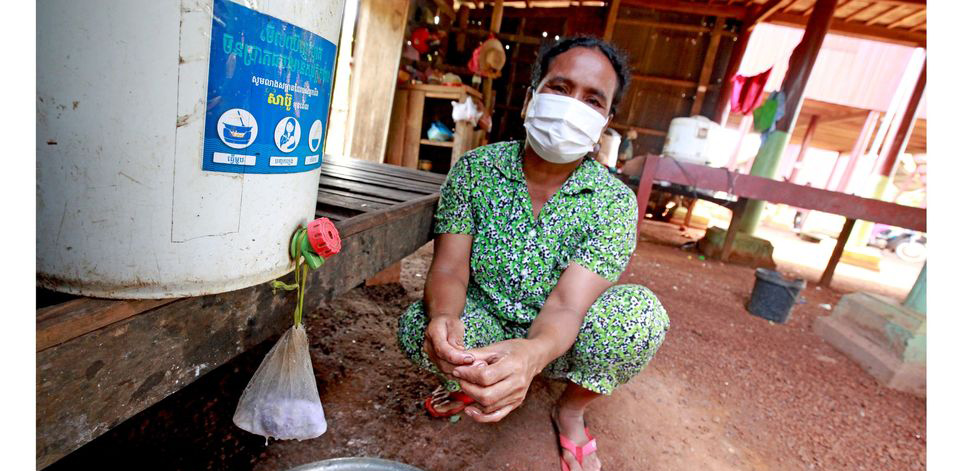
“I have noticed that my family doesn’t get sick often since we started washing hands and drinking filtered water. Frequent handwashing and drinking from filtered water keep my family healthy and free from frequent diarrhea.” – Phat Un, Khlei Village, Tbong Khmum Province
The overarching concept of the intervention campaign is “what looks clean might not be safe”. This was specifically designed to debunk the persistent misconception that it is clean when water and hands look clean. The intervention was carried out by a volunteer influencer in each selected village, often the village chief with the support of Interpersonal Communications Agents (IPCs) from the implementing partner Khemara. Villagers were invited to regular meetings at the influencer’s house where a demonstration handwashing station was set up to show case, attract attention and interest. During the meeting important health information were provided regarding to WASH key behaviors and misconceptions were challenged. Influencers and IPCs also provided support to any households building their own handwash stations and a bar of soap in a mesh bag that can be hung from the tap of the station were given as incentive when they meet the WASH key behavior requirements.
Additionally, posters were displayed in health centers, village/commune halls with call-to-action messages. Together with the loudspeakers broadcasting at regular interval, the intervention aimed to sensitize villagers with WASH key behaviors and to encourage participation.
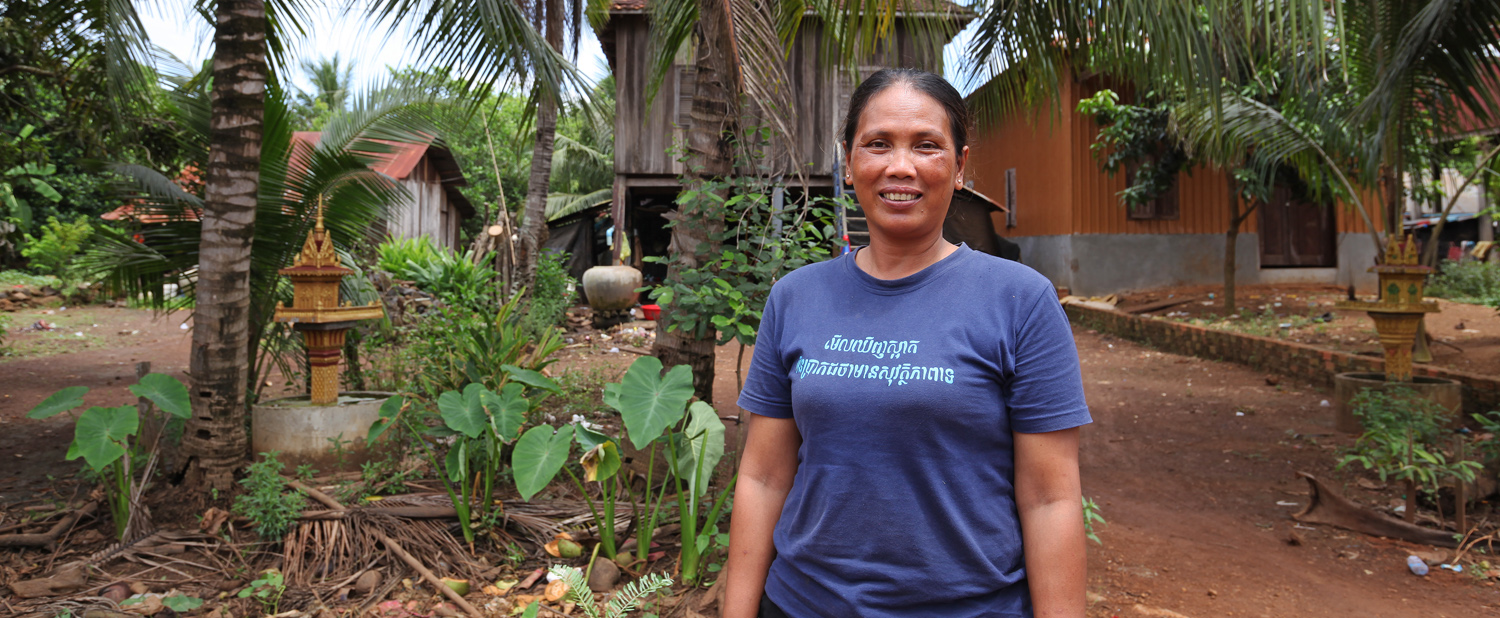
“Spending small amount of money around 1,6000 riels (US$4) to set up washing station and drink treated water so you don’t spend $10-12 and waste time to see a doctor when you are sick from diarrhea.” – Vath Sinath, Influencer, KraSang Village, Tbong Khmum Province
A number of motivators for villagers to take up the WASH key behaviors are revealed during interviews with volunteer influencers and beneficiaries at Khlei village and KraSang Village in Thbong Khmum province in August 2022. The first and foremost is the desire to keep children and household healthy and free of diarrhea. All key informants interviewed reported that frequent diarrhea had stopped since they started drinking treated water and washing hands at 5 critical times. The second motivator identified is that frequent handwashing as one key Covid-19 preventative measure promoted by the government and therefore many people already understood the importance of frequent handwashing to prevent infections and were motivated to do so. Additionally, all interviewed stated that they had received extensive support from the IPCs and influencers with regard to awareness raising and the more technical aspects of handwashing station set up. Some mentioned that the soap bar in a mesh bag is a great way to encourage children to wash hands. This is especially so when other children come to play at their homes.
On the other hand, a number of challenges were also identified during interviews. A key challenge is the lack of awareness on WASH and diarrhea, and the misconception that water and hands look clean so they must be clean. Without awareness, it was much harder to motivate villagers to attend meetings as they did not think it is necessary. Another challenge reported was “old habit dies hard” – it is easier and convenient and cost nothing to drink water directly from the source and it takes up too much time and effort to boil sufficient water for a day’s consumption and/or to purchase filtered water from vendors. The cost of the handwashing station kit is also a common challenge for villagers to follow the WASH key behaviors. It costs around 2,000 to 2,500 Riel to purchase a faucet to attach to the container and without awareness, this is an extra expense that villagers often reluctant to spend on.
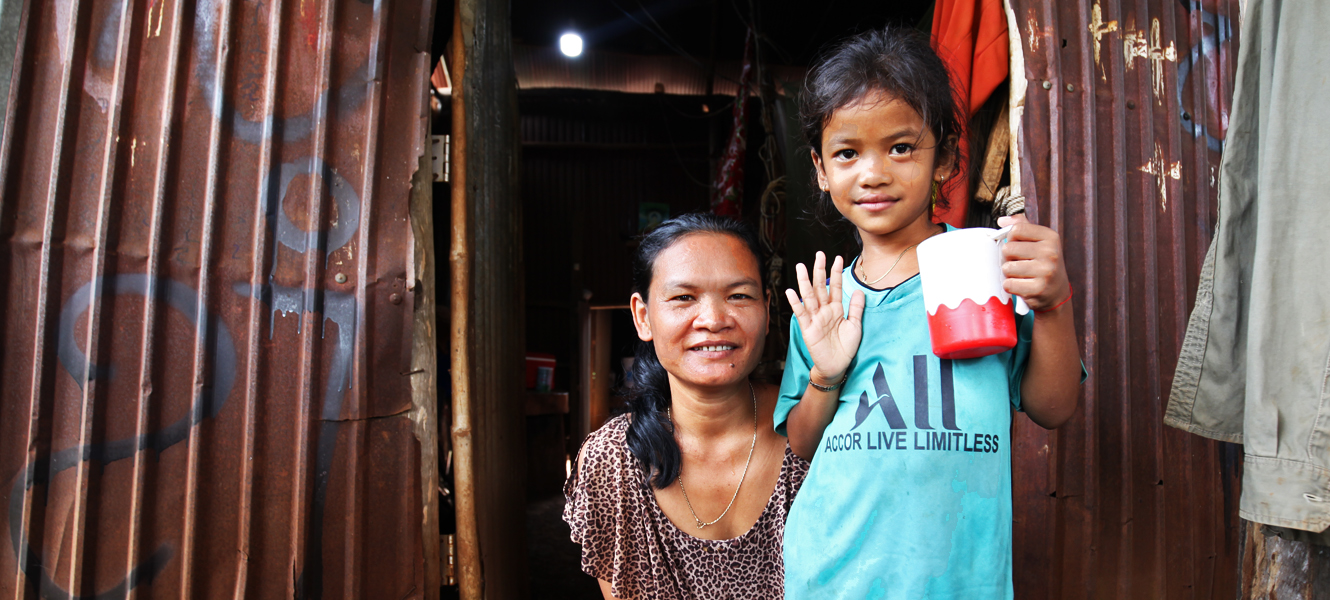
“My children really like to wash hands using the washing station and we do not have diarrhea since we follow the hand washing and safe drinking water recommendations.” – Meng Nary, KraSang Village, Tbong Khmum Province
To address these challenges, volunteer influencer Vath Sinath from KraSang Village uses her father as an example to show villagers how following WASH key behaviors improved his health and stopped frequent diarrhea. She also motivates villagers by highlighting the cost of setting up a handwashing station and drinking treated water (around $4) is much cheaper than the cost of seeing a doctor when getting sick (around $10-12). She also reminds villagers that they would have to take time off of work to care for sick family members.
During the first 6 months of intervention from July to November 2021, the target of 5% increase across 6 WASH key behaviors was achieved. Intervention activities were delivered to 3 operational districts in 180 villages in Thbong Khmum province. By the end of November 2021, forty-eight handwashing stations were set up. This success was further demonstrated during our follow-up interviews in August 2022 at two villages in the province. One year on after initiating the WASH intervention, 10 households at the Khlei village and 50 households at the KraSang village in Thbong Khmum province have set up handwashing stations at home and the level of WASH awareness have increased. Villagers who took up the 6 WASH key behaviors also reported the absence of diarrhea and improved health.
Although the project ends in September 2022, the knowledge of WASH and the key behaviors that have been adopted by the villagers will likely remain. It is hopeful that volunteer influencers with the support of local authorities in each village will continue to support their communities to adopt WASH key behaviors that will keep everyone healthy and free from infections.
